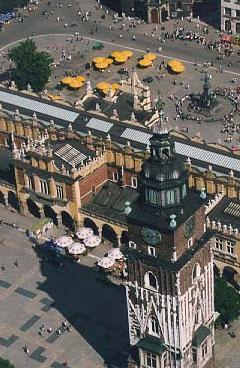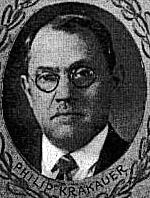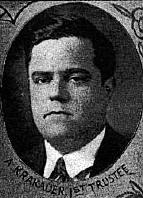
In the early nineteenth century, the Polish government required its citizens to adopt family surnames. Note 1 This was to keep track of the population, particularly for tax purposes. My uncle Bill Krakauer wrote, "The tax agents came around with lists." He further described the process. A name might be taken from a profession, such as schuster, schneider, schreiber, müller, fischer, etc. (in English, cobbler, tailor, writer, miller, and fisherman, respectively). Or a person might be named after a place where they had recently lived, such as Krakauer, Pariser, Wiener, Katzenellenbogen (from Krakau, Paris, Wien (Vienna), or Katzenelnbogen (Germany)). Note that when the name was taken from a city or town, Germanic languages usually add "er" to the end of the name, to indicate "from". If a suggested name had already been given out, they had lists of names taken from colors, such as blau, weiss, schwartz, roth, gelb, grau, and so on (blue, white, black, red, yellow, gray, ...), which hence became family names. So, why are we named "Krakauer"? We don't know whether someone further back in the family was from Kraków, or whether the family simply took the name of a large city, perhaps to sound more cosmopolitan. But we do know that the person from our family who first emigrated to the United States, Philip Krakauer, was in fact from the much smaller town of Bielsk. There are actually several towns with that name in Poland, but Philip is from the largest of them, Bielsk-Podlaski. It's substantially to the northeast of Kraków. In fact, it's a bit to the northeast of Warsaw. Note 2
Yiddish is a language very closely related to German, even though it is traditionally written phonetically in Hebrew characters. The name of the BBUV in German would be the "Bielsker Brüderlicher Unterstützung Verein", which differs from the Yiddish mainly in having two u's with umlauts (I'm not sure why "Unterstitzungs" sometimes appears with an "s", and sometimes without).
Just as Philip introduced Abe to the BBUV, he also brought his son into the Masons, another well-known fraternal organization (or "raised" his son in the Masons, as they put it). You can read about my joining the Masons in entry #0116, The Masons. If you peruse the Souvenir Journal, you'll notice that pages 11 through 15 are written in Hebrew characters. This is not Hebrew, but rather Yiddish. The members of the Association were all Jews from Bielsk, and their common language was Yiddish, not Polish. It's possible that some of them didn't speak Polish at all. All Jews of that era (and for that matter, many modern Jews) learn to read Hebrew, in order to read the Old Testament and other books in their original languages (Hebrew and Aramaic). Thus the phonetic Hebrew alphabet was the logical alphabet for them to use to transcribe Yiddish. Since as you know, I'm interested in linguistics, I wrote some more about the language in the blog entry after this one, entitled Yiddish. Starting with page 24, the remainder of the program contains advertisements purchased by individuals and businesses to support the BBUV. These include a full page ad placed by Philip, a smaller ad by Abe, and a full page ad placed by Kay Manufacturing Corporation, their company (in which, I notice, "Manufacturing" is misspelled on the first line). If you click to see these, come back with your browser's "Back" button. My cousin David Krakauer (a well-known clarinetist, and Bill's son), once threw a party for all the Krakauers in the Manhattan telephone book. About half of them showed up. Since he travels the world to perform, David finds himself in Kraków from time to time. On one such visit, he looked up another "David Krakauer" in the telephone book, and took him out to lunch. "Krakauer" is not a very common name in the United States. Nevertheless, although the town of Wayland, Massachusetts has fewer than 14,000 inhabitants, it has two residents named "Lawrence Krakauer". Not only that, but we're both MIT graduates who have worked, or are working, in the computer industry! Actually, he's the local guy, having grown up in Weston, Massachusetts, an adjacent town. I'm an import, having grown up in Great Neck, New York, 330 Km (200 miles) away. It's purely a coincidence. We are not related, and we finally met for the first time after the Wayland Town Meeting in April 2002. I looked around for a photographer to record our historic meeting, but couldn't find one. Due to being in such a small town and having the same last name, our families' paths have crossed from time to time in various ways.
On the pronunciation of "Krakauer": We are often called by telemarketers, who have our name in printed form. It's amusing to hear them trying to pronounce it. They usually have problems with what seems to be a run of vowels ("AUE") at the end. If I'm in a pedantic mood, I will sometimes explain to the caller how to pronounce almost all English names ending in "er". As noted above, an "er" ending is often preceded by the name of a city. Thus, someone named "Berliner" is from Berlin, and someone named "Krakauer" is from Krakau ("Krakau" is the German spelling). Even when it's not someone's name, the "er" ending usually means "from". Thus, a "New Yorker" is a person from New York. Note 4 On the other hand, the name "Miller" refers to someone who operates a mill. In that case, the portion of the name in front of the "er" specifies an occupation, not a city. But in either case, it ought to be obvious how to pronounce a name that ends in "er". Remove the "er", and pronounce what's left. Then add "er" as a separate syllable. KRA-cow-er. Sausages: In Germany, there are a great many different types of sausages, called in German Wursts. Two that are popular in the United States are called bratwurst and knockwurst. There is often one particular version that is the most typical of any given city. Two of these come from the cities Hamburg and Frankfurt, and are called, respectively, Hamburger Wurst and Frankfurter Wurst. Brought to the United States, these got shortened to simply hamburger and frankfurter, which became English words. A "Frankfurter" is basically "a person or a thing from Frankfurt". By the way, there's also a popular Wurst from Krakau (German spelling), called a Krakauer Wurst. It's a type of ham sausage, and it's very good. Berliner: Having mentioned "Berliner", perhaps I should say something about the supposed error made by President John Fitzgerald Kennedy in his speech at the Berlin wall (see it here on YouTube). To show his solidarity with the people of Berlin, he said, "Ich bin ein Berliner". It was subsequently reported that to say, "I am a Berliner", he should have said "Ich bin Berliner", without the indefinite article "ein". "Ich bin ein Berliner" can be taken to mean "I am a jelly donut". The use of articles is different in different languages, and very tricky. Consider an English example. What if, trying to show solidarity with the people of Denmark, someone said in English, "I am a Danish", instead of "I am Danish"? A resident of Berlin would normally say of himself "Ich bin Berliner", and ein Berliner is indeed, in some parts of Germany, a kind of jelly donut. But with more careful analysis, it turns out that Kennedy didn't make a mistake at all. He was, of course, not literally a Berliner, and apparently including the article "ein" gives the sentence a figurative, rather than literal, meaning (this is a fine point well beyond anything I remember from my college German). For more on this, see articles on the topic in Wikipedia and Snopes.
  Note 1: In the past, not all groups used family "surnames". For example, Jewish people, over many centuries, used names such as "Moshe ben Dovid", meaning "Moshe, son of Dovid (David)". You might also recall the Scandinavian system, in which "Frederiksen" meant "son of Frederik". In that system, a child of "Nils Frederiksen" might be named "Lars Nilssen", and his son might be named "Arvid Larssen", and so on ("Arvid Larssen" = Arvid, Lars's son). [return to text] Note 2: Click the next link to see "An Introduction to Bielsk", by Mark W. Gordon (clicking takes you off my page). Of all my siblings and cousins, my cousin Steve Krakauer is the most interested in the history of the Krakauer family. As to why we spell our name "Krakauer" and not "Krakower", Steve wrote, "The Germanic spelling (auer) is unattributable. As most immigrants came through Hamburg, it is very conceivable that the first Anglicized spelling was there. This is all pure speculation, as I know of no way to validate it at this time. I have not found PK ('Philip Krakauer') in any census records or any ship arrival records for the date he supposedly arrived. But all PK's siblings seem to have spelled Krakauer the same way, including the branch that emigrated to South Africa." Steve reports that Philip Krakauer arrived in January of 1888. Note that Ellis Island was not opened as a reception center until 1892. [return to text] Note 3: All the links in this note take you off my page, so you might want to come back and explore them later. A good deal is known about Bielsk and the BBUV because a great deal of information has been preserved on the web by JewishGen, an affiliate of the Museum of Jewish Heritage. They have a page called "JewishGen KehilaLinks" (formerly "ShtetLinks"), a project "facilitating web pages commemorating the places where Jews have lived." From there, one can click to "Poland", and then to "Bielsk-Podlaski", for information on the town and its Jewish population in the past. Then one of the links takes you to the "Bielsker Bruderlicher Unterstitzungs Verein" ("BBUV"). And one of the links on the BBUV page is to the 1928 "Complete 40th Anniversary Banquet Souvenir Journal". [return to text] Note 4:
The names of city residents are often irregular. The residents of both Cambridge, England and Cambridge, Massachusetts (USA) are "Cantabrigians". I once explained to a Frenchman that while the residents of New York are "New Yorkers", the residents of Boston are "Bostonians". Then, to see if he knew "Chicagoan", I asked if he knew what the residents of Chicago are called. "Ah, Oui", he replied, "gangsters" (which he pronounced "gong-stair"). He'd evidently seen a lot of American movies.
OK, I admit I stole this footnote from "The Ayache formula". [return to text]
 |
 The photo to the left shows a portion of the main square of Kraków, Poland, the city which is the source of my family name. Spelled "Kraków" in Polish, and most frequently "Krakow" in English, the city name is spelled "Krakau" in German. And in Germanic languages, "Krakau-er" simply means "someone from Krakau".
The photo to the left shows a portion of the main square of Kraków, Poland, the city which is the source of my family name. Spelled "Kraków" in Polish, and most frequently "Krakow" in English, the city name is spelled "Krakau" in German. And in Germanic languages, "Krakau-er" simply means "someone from Krakau". 
 Philip brought his son
Philip brought his son